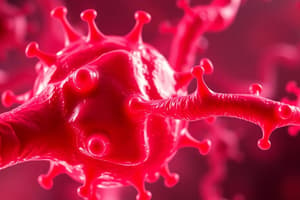Podcast
Questions and Answers
What is desensitization in the context of receptor response?
What is desensitization in the context of receptor response?
- The permanent alteration of receptor formation.
- The immediate effect of a drug on cellular pathways.
- A decrease in receptor responsiveness following agonist exposure. (correct)
- An increase in receptor sensitivity after agonist exposure.
What is one potential clinical impact of receptor desensitization?
What is one potential clinical impact of receptor desensitization?
- It may necessitate larger doses or drug holidays. (correct)
- It ensures consistent drug efficacy over time.
- It bypasses the need for dose adjustments.
- It eliminates the need for combination therapies.
What does the therapeutic index quantify?
What does the therapeutic index quantify?
- The variation in drug response across different receptors.
- The ratio of lethal dose to effective dose. (correct)
- The rate of drug metabolism in the liver.
- The effectiveness of a drug regardless of dose.
How can desensitization occur at the receptor level?
How can desensitization occur at the receptor level?
What does ED stand for in the context of dose-response relationships?
What does ED stand for in the context of dose-response relationships?
What is indicated by a low therapeutic index?
What is indicated by a low therapeutic index?
Which process may be used to combat the effects of desensitization?
Which process may be used to combat the effects of desensitization?
What does the therapeutic index measure in drugs?
What does the therapeutic index measure in drugs?
What does TD refer to in therapeutic indices?
What does TD refer to in therapeutic indices?
What characterizes drugs with a narrow therapeutic index (NTI)?
What characterizes drugs with a narrow therapeutic index (NTI)?
Which drug characteristic is preferred in clinical practice?
Which drug characteristic is preferred in clinical practice?
If Drug A has an ED50 of 100 mg and a TD50 of 300 mg, what is its therapeutic index?
If Drug A has an ED50 of 100 mg and a TD50 of 300 mg, what is its therapeutic index?
What does a therapeutic index greater than 1 indicate?
What does a therapeutic index greater than 1 indicate?
Which of the following is an example of a potential consequence of using a drug with a narrow therapeutic index?
Which of the following is an example of a potential consequence of using a drug with a narrow therapeutic index?
What does a high therapeutic index imply about a drug's safety?
What does a high therapeutic index imply about a drug's safety?
In pharmacology, what is the significance of identifying a drug's TD50?
In pharmacology, what is the significance of identifying a drug's TD50?
What is the primary function of activated charcoal in medical treatment?
What is the primary function of activated charcoal in medical treatment?
What role do receptors play in drug interaction with target cells?
What role do receptors play in drug interaction with target cells?
Which of the following substances is specifically used as a laxative?
Which of the following substances is specifically used as a laxative?
How does signal transduction occur after a drug binds to a receptor?
How does signal transduction occur after a drug binds to a receptor?
After a drug leaves a receptor, what happens to the receptor?
After a drug leaves a receptor, what happens to the receptor?
What distinguishes receptor molecules from other cellular structures?
What distinguishes receptor molecules from other cellular structures?
What mechanism do antacids use to alleviate symptoms of peptic ulcer disease?
What mechanism do antacids use to alleviate symptoms of peptic ulcer disease?
Which of the following describes a common characteristic of receptors?
Which of the following describes a common characteristic of receptors?
What is the main role of the ligand-binding domain in a receptor?
What is the main role of the ligand-binding domain in a receptor?
Which statement best describes receptor selectivity?
Which statement best describes receptor selectivity?
What does the term 'affinity' refer to in the context of receptors?
What does the term 'affinity' refer to in the context of receptors?
Which of the following best defines intrinsic activity?
Which of the following best defines intrinsic activity?
What characterizes a full agonist?
What characterizes a full agonist?
Why is receptor binding often compared to a 'plug and socket' mechanism?
Why is receptor binding often compared to a 'plug and socket' mechanism?
Which of the following statements about affinity and intrinsic activity is true?
Which of the following statements about affinity and intrinsic activity is true?
What effect does the chemical messenger have once it binds to the effector domain?
What effect does the chemical messenger have once it binds to the effector domain?
What does a higher therapeutic index indicate when comparing two drugs?
What does a higher therapeutic index indicate when comparing two drugs?
What is the therapeutic index of Drug B given its ED50 and LD50?
What is the therapeutic index of Drug B given its ED50 and LD50?
Which of the following best describes drug potency?
Which of the following best describes drug potency?
In clinical practice, drugs with a therapeutic index below what value are generally avoided?
In clinical practice, drugs with a therapeutic index below what value are generally avoided?
What aspect of a drug does efficacy refer to?
What aspect of a drug does efficacy refer to?
If Drug A has an ED50 of 5 mg/kg and an LD50 of 50 mg/kg, what is its therapeutic index?
If Drug A has an ED50 of 5 mg/kg and an LD50 of 50 mg/kg, what is its therapeutic index?
Which of the following statements about drug safety is correct?
Which of the following statements about drug safety is correct?
What is not a characteristic of drug efficacy?
What is not a characteristic of drug efficacy?
Flashcards are hidden until you start studying
Study Notes
Activated Charcoal, Ispaghula Husk, Antacids
- Activated Charcoal is used to adsorb ingested drugs or poisons.
- Ispaghula husk is a laxative used to treat constipation.
- Antacids are used to neutralize gastric acid, particularly in peptic ulcer disease.
- Other ways of observing drug effects include physical, chemical, and enzymatic actions.
Drug Action: Receptors
- Most drugs bind to specific regulatory macromolecules known as receptors on the cell membrane.
- Receptors are protein molecules which primarily reside on the cell membrane, but in some cases, they can be found in the cytoplasm.
- These receptors often interact with endogenous molecules to initiate an effect.
- The messenger molecule binds to the receptor, triggering a conformational change in the receptor structure, which then sends a signal without allowing the messenger molecule into the cell.
Signal Transduction
- This process involves receptor conformation change to send a message.
Receptor Structure
- Receptors have two domains:
- Ligand-binding domain: The site where the chemical messenger attaches.
- Effector domain: The domain where the effect of binding is observed.
Receptor Selectivity
- Receptors are highly selective, meaning they only bind to certain types of messenger molecules.
- This selectivity is due to the unique size, shape, and structure of the active site of the receptor, allowing only molecules with the best fit to bind.
- This is often described as a "plug and socket" mechanism.
Affinity and Intrinsic Activity
- Affinity: The ability of a drug to bind with the receptor.
- Intrinsic Activity: The capacity of a drug to induce a functional change in the receptor.
- These two properties are independent of each other.
Agonist/Full Agonist
- An agonist drug has both affinity and maximum intrinsic activity.
- Agonists bind to the receptor, triggering a response by modifying gene expression and altering various cellular processes.
Receptor Desensitization and Downregulation
- Receptor Desensitization: A process that reduces the cell's responsiveness to further stimulation after prolonged exposure to an agonist.
- Receptor Downregulation: This process can involve changes in receptor levels and expression, taking hours or days.
- Drug Holidays: Periods of time when a drug is not taken to allow the body to recover sensitivity and prevent desensitization.
Dose and Effect
- As the dose of a drug is increased, the effect typically increases, often until a plateau is reached.
Dose-Effect Curve
- This curve shows the relationship between the dose of a drug and its effect.
- It is also known as a Dose-Response Curve.
- Therapeutic Index: A measure of drug safety, calculated as the ratio between the toxic dose (TD) and the effective dose (ED) of a drug.
- It indicates the safety margin between the therapeutic dose and the toxic dose.
- Therapeutic Index in Animals: Calculated as LD50/ED50.
- Therapeutic Index in Humans: Calculated as TD50/ED50.
Clinical Relevance of Therapeutic Index
- Drugs with a narrow therapeutic index require careful monitoring and dosing as small changes in dose can lead to significant adverse effects.
- Drugs with a wide therapeutic index are generally considered safer as their therapeutic and toxic doses are further apart.
Drug Potency and Efficacy
- Potency: The amount of drug required to produce a defined response.
- Efficacy: The maximum effect that a drug can achieve.
Safety Considerations
- Only drugs with a therapeutic index greater than 1 are considered safe for clinical use.
Studying That Suits You
Use AI to generate personalized quizzes and flashcards to suit your learning preferences.




